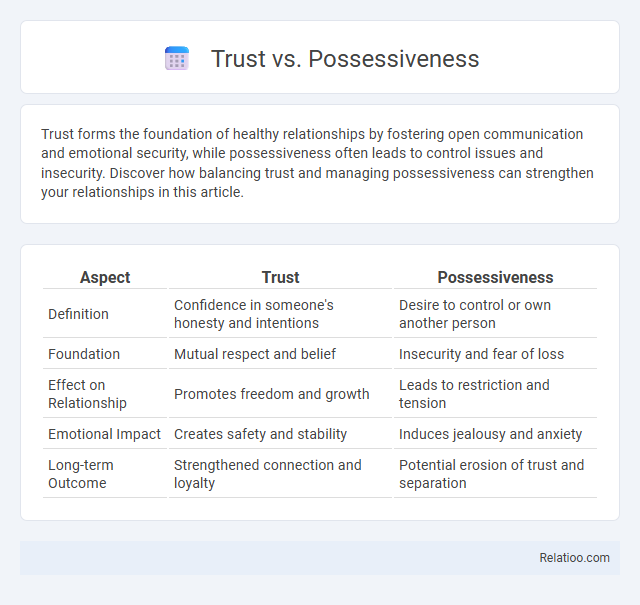Trust forms the foundation of healthy relationships by fostering open communication and emotional security, while possessiveness often leads to control issues and insecurity. Discover how balancing trust and managing possessiveness can strengthen your relationships in this article.
Table of Comparison
| Aspect | Trust | Possessiveness |
|---|---|---|
| Definition | Confidence in someone's honesty and intentions | Desire to control or own another person |
| Foundation | Mutual respect and belief | Insecurity and fear of loss |
| Effect on Relationship | Promotes freedom and growth | Leads to restriction and tension |
| Emotional Impact | Creates safety and stability | Induces jealousy and anxiety |
| Long-term Outcome | Strengthened connection and loyalty | Potential erosion of trust and separation |
Understanding Trust in Relationships
Understanding trust in relationships involves recognizing trust as a foundational element that fosters security, openness, and emotional intimacy between partners. Unlike possessiveness and jealousy, which often stem from insecurity and fear of loss, trust encourages mutual respect and confidence in each other's commitment. Building trust requires consistent honesty, effective communication, and reliability, which together create a stable environment where love and connection can thrive.
Defining Possessiveness and Its Roots
Possessiveness arises from an intense desire to control or own a relationship, often rooted in insecurity and fear of abandonment. It manifests as a need to monitor a partner's actions and restrict their interactions to maintain a sense of dominance. Understanding possessiveness involves recognizing its psychological origins, including low self-esteem and attachment anxieties.
Key Differences Between Trust and Possessiveness
Trust involves confidence and security in a relationship, allowing partners to feel valued without constant oversight, while possessiveness stems from insecurity and a need to control or dominate. Possessiveness often leads to jealousy, marked by suspicion and fear of losing the partner, contrasting with trust's foundation of mutual respect and freedom. Understanding these differences helps build healthier, more balanced relationships by distinguishing supportive behavior from controlling tendencies.
Signs of Healthy Trust
Signs of healthy trust include open communication, consistent honesty, and mutual respect, which create a secure foundation in your relationships. You notice that both partners feel safe expressing vulnerabilities without fear of judgment or control. When trust thrives, possessiveness and jealousy diminish, allowing emotional intimacy to deepen naturally.
Red Flags of Possessive Behavior
Possessive behavior often reveals red flags such as constant monitoring of your activities, controlling who you interact with, and extreme jealousy over minor interactions. These actions undermine trust and can escalate into emotional manipulation or isolation. Recognizing these signs early helps protect your emotional well-being and maintain healthy relationship boundaries.
Impact of Trust on Relationship Growth
Trust serves as the cornerstone for relationship growth, fostering open communication and emotional security that diminish feelings of possessiveness and jealousy. When Your partner feels genuinely trusted, it encourages mutual respect and strengthens the bond, promoting long-term stability. A lack of trust, conversely, often triggers possessiveness and jealousy, hindering intimacy and impeding the relationship's progress.
How Possessiveness Damages Emotional Bonds
Possessiveness undermines emotional bonds by fostering insecurity and creating barriers to open communication, leading to feelings of suffocation and resentment in relationships. Unlike healthy trust, possessiveness triggers controlling behaviors and constant suspicion, which erodes mutual respect and intimacy. Long-term emotional damage occurs as partners feel restricted and undervalued, weakening the foundational connection essential for a thriving relationship.
Building Trust: Essential Steps for Couples
Building trust in a relationship requires consistent honesty, open communication, and mutual respect to create a secure emotional foundation. Couples should establish clear boundaries and practice empathy to navigate feelings of possessiveness and jealousy effectively. Regularly expressing appreciation and addressing insecurities transparently strengthens the bond and minimizes misunderstandings.
Overcoming Possessiveness: Practical Strategies
Overcoming possessiveness requires cultivating trust through open communication and emotional transparency, allowing you to build secure and healthy relationships. Practicing self-awareness helps identify possessive triggers, while setting boundaries ensures respect for both your and your partner's individuality. Embracing empathy and fostering mutual respect transform possessiveness into a foundation of trust rather than control.
Cultivating a Balance for Lasting Connection
Cultivating a balance between trust, possessiveness, and jealousy is essential for fostering lasting connections in relationships. Trust creates a foundation of security and openness, while managing possessiveness prevents emotional confinement, and understanding jealousy allows for healthy communication about insecurities. Prioritizing mutual respect and emotional intelligence supports a harmonious dynamic where both partners feel valued and understood.

Infographic: Trust vs Possessiveness
 relatioo.com
relatioo.com